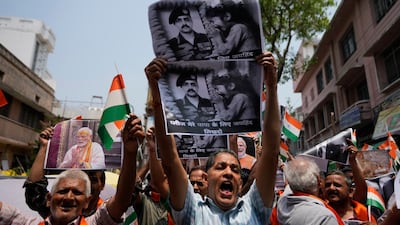At least four Indian soldiers and a police officer were killed during a gunfight with suspected militants in the latest round of violence in the Jammu region of Indian-administered Kashmir, authorities said.
The Indian Army said late on Monday that four of its men, including a captain, were killed in a firefight during a search operation in the forests of Doda region in Jammu.
"Contact with terrorists was established at about 9pm in which heavy firefight ensued," the army posted on X on Monday night.
It was the second major incident of violence in a week in the Hindu-majority Jammu region, which is part of the Indian union territory of Jammu and Kashmir.
Jammu has avoided the brunt of the separatist rebellion in the neighbouring Kashmir valley, where armed Muslim militants have been fighting against Indian troops for more than three decades, but violence has flared recently.
At least five soldiers were killed and six injured in an ambush by militants in the remote Machedi area of Kathua district in Jammu on July 8.
The gunfight followed an attack on a Hindu pilgrim bus in Reasi that left 10 people dead last month.
India accuses arch-rival Pakistan of training and arming Kashmiri militants.
Prime Minister Narendra Modi’s government has claimed normality was returning to the Kashmir valley after it repealed Jammu and Kashmir's special status via Article 370 in 2019.
The government's decision stripped the region of its limited autonomy and brought it under New Delhi's direct control, while rejecting Islamabad’s assertions that the entire Kashmir region is a disputed territory.
The erstwhile kingdom of Jammu and Kashmir was split between India and Pakistan at the end of British rule in 1947. Both countries claim the entirety of the territory.
An armed rebellion against India erupted in 1989 and has left tens of thousands of people dead, with anti-India sentiments running high in the Muslim-majority Kashmir valley and parts of the mountainous Jammu region.

Mr Modi’s government had argued the semi-autonomous status fuelled separatist sentiments in Kashmir. It has used an ironclad policy to crush dissent in the Kashmir valley, with government forces launching a crackdown on armed militants and their support base.
Hundreds of people, including politicians and civil rights activists, have been jailed in the past five years over anti-India views.
This has led to a drop in civil disruption and militant violence in Kashmir. However, armed attacks on government forces in Jammu have increased.
At least 48 soldiers have reportedly been killed in gunfights in the Jammu region since December 2021, according to the NDTV news channel.
“Pakistan will remain a constant factor because as it continues to exist in the nation, it will support terrorism,” retired Indian lieutenant colonel JS Sodhi told The National.
“In the last couple of years, we have seen an increased number of attacks in the Jammu region. Before that, it was limited to the Kashmir valley, mainly because the security grid had become very effective and the militants were not able to strike with ease. They have shifted their base to the Jammu region, which was very peaceful.”
Lt Col Sodhi, who served in Kashmir and is now editor of the Global Strategic and Defence News magazine, said a political vacuum in the region coupled with Pakistan and China’s support was behind the spate of armed attacks in Jammu. He said the strategy was part of a larger Chinese-Pakistani plan against New Delhi.
India has fought two wars with Pakistan over Kashmir, while relations with China have become strained over border disputes.

Diplomatic ties between India and China have been frosty since their troops were involved in deadly clashes in 2020, along a section of border in the Ladakh region, formerly a part of Indian-administered Kashmir that became federally ruled in 2019.
At least 20 Indian and four Chinese soldiers died in medieval-style, hand-to-hand fighting on the mountain cliffs.
While several rounds of high-level talks have been held between senior military commanders and Foreign Ministry officials from India and China, there has been no dialogue over Kashmir with either local leadership or with Pakistan.
“From the beginning of this year, we are seeing an increase in Chinese assertiveness in the South China Sea, as there is an increase in terrorist activities in Jammu and Kashmir,” said Lt Col Sodhi.
“Both these things are connected and are part of a larger game plan because they want these regions to be turbulent so as to send the message to the international community that these regions are not peaceful."
He called for political discourse to curb militancy and instil peace in the region that has remained without an elected government since 2018.
“The Indian security forces are working day and night to curtail and contain this terrorism,” he said. "But what is needed at this hour is a political dialogue among all the political parties which are dominant or are effective in Jammu and Kashmir.
“In the last five years, only one all-political party meeting was held in there in June 2021 … with China. We have had 21 level-of-core-commander meetings between India and China.
“Until and unless a political dialogue is initiated, it is very difficult to end terrorism in Jammu and Kashmir because it has been over 35 years and the end of terrorism is nowhere in sight.”


